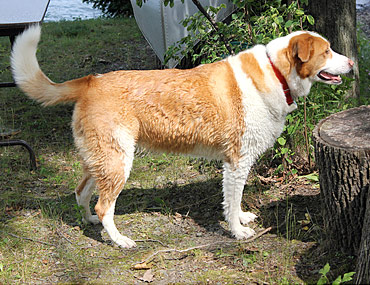Overview
This hefty medical term refers to a very common problem for us as well as for our furry friends. Campylobacteriosis causes enteritis, an inflammation of the intestinal tract, which can result in diarrhea.
This disorder, which is caused by a nasty little bacterium, is the leading cause of intestinal disease in people. Your pet can be a carrier of the bacteria without showing any signs of the disease. When dogs and cats are symptomatic, it is often when they are younger than 6 months of age.
Puppies and kittens with diarrhea who are younger than 6 months of age and who live in crowded conditions, poor sanitation, or are under stress due to surgery, pregnancy, or illness are at a higher risk. Pets with concurrent intestinal diseases and infections caused by parvovirus, Salmonella, Giardia and other intestinal parasites are also at an increased risk.

Symptoms
The most common result of campylobacteriosis is enteritis, which means an inflammation of the small intestine, and usually results in diarrhea. Along with diarrhea, your poor pet may also experience abdominal pain, vomiting, fever, black tarry feces (melena), and weight loss.
Because there are so many causes of enteritis, be sure to provide your veterinarian with a thorough history of your dog or cat, including answers to the following:
- Symptoms?
- Travel history?
- Exposure to other animals (such as going to the park or daycare)?
- Unsupervised access to your yard?
- Leashed on walks?
- Eaten any foreign objects, e.g., a Christmas ornament?
- Eaten from garbage?
- Changes in food?
Diagnosis
Your veterinarian will want to confirm campylobacteriosis and identify is there are any concurrent diseases or conditions. In order to do this, a combination of the following tests may be recommended:
- Chemistry tests to evaluate kidney, liver, and pancreatic function, as well as sugar levels
- A complete blood count to rule out blood-related conditions
- Electrolyte tests to ensure your dog isn't dehydrated or suffering from an electrolyte imbalance
- X-rays of the abdomen and intestinal tract to rule out obstructions
- An ultrasound to evaluate the integrity of your dog’s digestive tract
- An endoscopy to evaluate the intestinal tract
- Specific tests to rule out viral infections, such as parvovirus
- Fecal tests to identify if fecal parasites could be the cause
- Special fecal tests, such as cultures and PCR testing
Treatment
Pets with enteritis, regardless of the cause, are often dehydrated and sometimes need to be given intravenous fluid therapy. Depending on the severity, your cat or dog may be hospitalized to more quickly gain control of the diarrhea and other debilitating symptoms. In less severe cases, your veterinarian may give you medications and instructions regarding how to care for your pet at home. It is very important that you carefully follow the treatment instructions from your veterinarian so that the chances of the diarrhea recurring are slim to none.
Prevention
The best prevention of this condition is to avoid situations that may expose you or your four-legged friend to high-risk environments, such as unsanitary locations, crowded kennels, etc. Most important: if your pet develops diarrhea, contact your veterinarian.
If you have any questions or concerns, you should always visit or call your veterinarian – they are your best resource to ensure the health and well-being of your pets.
